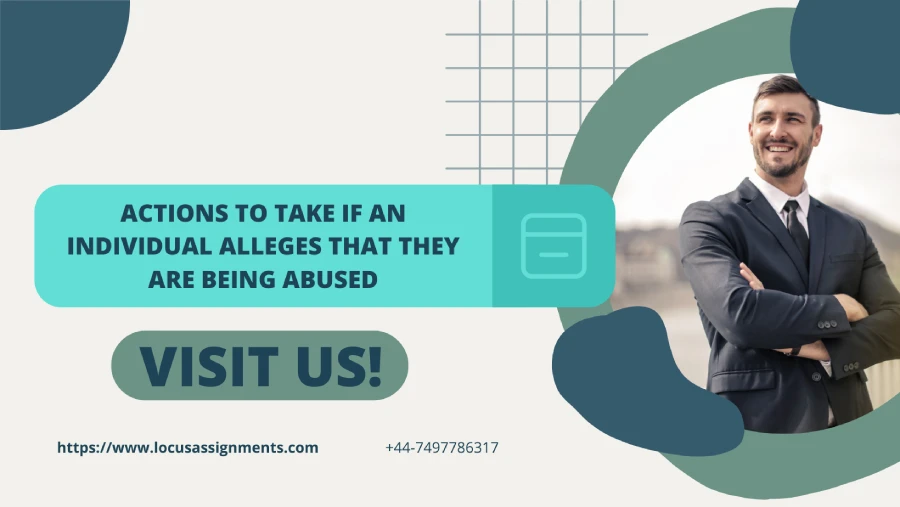Actions to take if an individual alleges that they are being abused

2.3 Explain actions to take if an individual alleges that they are being abused
Course: NVQ Level 4 Diploma In Health And Social Care (RQF)
Unit 12: Understand safeguarding and protection in health and social care settings
LO2: Understand how to respond to suspected or alleged abuse
When someone reports an allegation of abuse in a health or social care environment, you will need to take swift and sensitive action, following the specific procedures that are in place to protect the individual and to provide safeguarding as an employee or representative of a service. Here are the main steps that you will need to take as soon as possible:
Listen and Reassure
The first step is to listen to the individual patiently and calmly without shock or disbelief. It is important to provide the individual with emotional support and reassurance by acknowledging that they are taking all the right steps by disclosing the information. You need to stress that their disclosure will be taken seriously. You should avoid asking leading questions or probing for details; just let them talk about it at their own pace.
Ensure Immediate Safety
You need to consider the immediate safety of the individual. If the person is in some type of danger, you should act, even if that is to protect them from an alleged abuser or even call emergency services. If not in immediate apparent danger, you should think about any changes needed to the individual to ensure their safety and well-being.
Report the Allegation
Report the allegation immediately to the organisation's named safeguarding lead, supervisor or manager in accordance with the organisation’s safeguarding and protection policies. Report the allegation as soon as possible, clearly and using the individual's own words where you can. Do not try to investigate or confront the alleged abuser yourself.
Record the information.
Write down the allegation, including the time, date, what the individual said and any visible injury or evidence you have seen, using the individual's own words as much as possible, and do not put in your own opinion. Keep your records safe and confidential; only share information with those that need to know for the safeguarding process.
Support and Empower the Individual
You should continue to support the individual emotionally and practically. This could include arranging for counselling, medical help, or advocacy services and allows the individual to be empowered in making decisions about what to do next, where this is possible. You can continue to check in with the individual within the limits of your role to ensure their ongoing safety and well-being.
Collaborate with Professionals
Be willing to work with the appropriate outside agencies as required, including social services and police providing timely and accurate information and cooperating in investigations as required. Ensure actions are in adherence to current legislation, statutory and regulatory duties, and organisation protocol.
Maintain Confidentiality and Reflect
Always respect confidentiality, sharing only with appropriate professionals. Following that, you need to reflect on the experience and, if required, attend further training in safeguarding and maintaining awareness of best practice in safeguarding procedures.
Taking the above comprehensive actions should ensure that allegations of abuse or neglect are dealt with professionally, ethically and in accordance with legislation and statutory and regulatory duty, as well as organisational duty, thereby protecting individuals from further abuse or neglect.
Need health and social care assignment help ? Get guidance from a trusted assignment help in the UK at Locus Assignments to simplify complex topics.
Need Assignment Help?
Get the Expert Assignment helper to help you!
Fast • Reliable • Expert Support
Upload NowOther Assignments